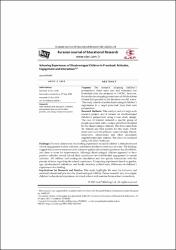Schooling experiences of disadvantaged children in preschool: attitudes, engagementand interactions

View/
Access
info:eu-repo/semantics/openAccessDate
2020Author
Anadolu Üniversitesi, Eğitim Fakültesi
0000-0002-4602-8901
Arıkan, Arzu
Metadata
Show full item recordCitation
Arıkan, A. (2020). Schooling Experiences of Disadvantaged Children in Preschool: Attitudes, Engagement and Interactions. Eurasian Journal of Educational Research, 20(86), 1 - 24. Doi: 10.14689/ejer.2020.86.1Abstract
Purpose: The research adopting children’s perspectives about early care and education has flourished since the adoption of UNCRC; however, the studies investigating experiences of children from diverse backgrounds in the literature are still scarce. This study aims to describe disadvantaged children’s experiences in a target preschool from their own perspectives. Research Methods: This study is part of a large-scale research project, and it focuses on disadvantaged children’s perspectives using a case study design. The case of interest included a specific group of people associated with a unique preschool designed for the disadvantaged children. The data comes from 26 children and their parents for this study. Child-interviews were the primary source of data. Parent-interviews, observations and other documents supplemented data analysis. The data was analyzed using ATLAS.ti 7 Software. Findings: The basic dimensions of schooling experiences included children’s attitudes toward school, engagement in daily activities, and echoes of school experiences at home. The findings suggest that access to resources does not mean quality educational experiences for all children, and there is room for improvement. Although disadvantaged children appeared to have positive attitudes toward school, their experiences involved limited engagement in certain activities. All children had inadequate stimulation and low-quality interactions with the parents at home regarding the school experiences. Comparing experiences based on gender, age, developmental milestones and family structure yielded some differences in children’s experiences of schooling. Implications for Research and Practice: This study highlights the need for inclusive and enriched educational practices for disadvantaged children. Future research may investigate children’s educational experiences in mixed schools and examine home-school connections.

















